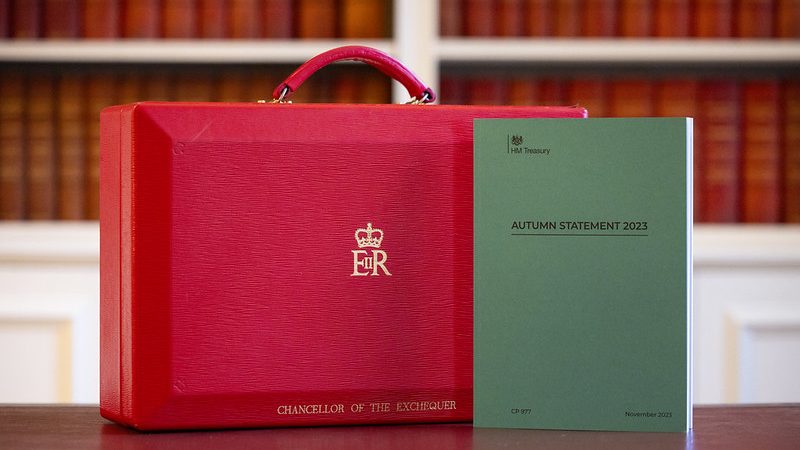
The economics of this Autumn Statement do not add up. The Chancellor has all but undone a year’s work restoring the UK’s economic credibility since Truss’ disastrous mini-budget, with the gamification of the fiscal rules stretching credulity to breaking point. By maxing out the fiscal credit card, Jeremy Hunt delivered another fiscal event that stores up even more problems down the line.
In the medium term, taxes will have to rise. CPP analysis estimates a £142bn gap in the public finances each year to 2030 just for public services to stand still, such are the cost implications of our ageing population on the state pension, health and social care. Unfortunately for Labour, it is more likely to be their problem than the Tories’. This is one of three traps Labour faces on its path to power.
‘Profligacy’, post-election austerity and public service pressure
The first trap comes as standard given Labour’s historic label as the party of tax and spend. False narratives surrounding the financial crash – namely that this global phenomenon was a product of New Labour’s profligate domestic spending – still linger in the public memory.
Rachel Reeves and Keir Starmer have rehabilitated the party’s economic credentials and built bridges into business and industry circles. But Conservative political attack lines still hold some sway, and Labour can be sure the Tories will go in hard on this one in an election set to be fought on the economy.
The Chancellor set the second trap in his March Budget and twisted the knife in this Autumn Statement, safe in the knowledge that the Tories probably won’t be the ones left carrying the can. By squeezing real-terms spending on public services post-election and offering headline tax cuts today, the Tories force Labour to follow suit or risk being tarred with the old tax-and-spend brush they are desperate to avoid.
The third, and perhaps most dangerous trap, is the gap between what Labour feels it can spend and what the economy actually needs. In our recent report, Funding Fair Growth, CPP argued for £19bn of spending to create the foundations for productivity growth across the country, targeted on childcare, further education, preventative health and supporting the creation of good local jobs. Our modelling suggests that doing so could generate an additional £160bn in economic output, equivalent to approximately 7% of GDP.
Trade-offs in power
Labour is right that more can be done with smarter spending of existing resources and by incentivising private sector investment, but there are still big questions about how this will happen and how it will manage the tradeoffs involved in not funding more in day-to-day or capital spend after more than a decade of public sector austerity and deterioration.
That deterioration seems set to continue under plans laid out in the Autumn Statement.
The Chancellor placed a welcome emphasis on the need to unlock business investment to tackle poor productivity but was light on the detail of his supply side measures – especially on skills and planning – and ambitious on the extent to which the government will manage to devise, let alone deliver, meaningful policy change in the short term. Combined with implausible real term cuts to public investment, it is far from clear how Hunt’s Autumn Statement contributes to shoring up our ailing public services or boosting productivity.
Labour will have to navigate the first two of these traps to win the election and could be so hemmed in by the third that they too will struggle to enact the scale of change needed to foster fast, fair growth. Already it has had to scale back its £28bn per year Green Prosperity Plan and questions remain as to whether and how this forms the basis of their industrial strategy, as well as their wider economic policy.
Labour offers hope on borrowing to invest for growth
Rachel Reeves is right to focus on beefing up our economic institutions as a way of restoring stability and credibility to fiscal policy making.
Assumptions about future cuts spending in this Autumn Statement verge on farcical, highlighting not only the damage that short-term fiscal rules can do but also raising profound questions about the OBR’s independent forecasting and accountability process and its relationship to government fiscal policy decision making.
Here Labour offers a glimmer of hope as Reeves has indicated an appetite for borrowing to invest in long-term growth. CPP recommends more flexible fiscal rules with 10-year horizons that enable investments with long-term returns. This offers Labour a route to delivering fair growth in government while maintaining fiscal discipline in both the short and longer term.
The Tories may be desperately scrabbling for political gain ahead of a bruising election.
But whoever wins will quickly learn that they will need to spend more money just to get the same public services outcomes. Drained by over a decade of austerity, the UK economy needs significant investment – both from the public sector and by business – to shift out of our low-productivity, low-growth malaise.
Labour will have to start with radical fiscal reform if it is to prevent public services and local government from crumbling beyond repair. It will be no mean feat, and traps lie waiting at every stage.




More from LabourList
Almost half of Labour members oppose plans to restrict jury trials, poll finds
‘How Labour can finally fix Britain’s 5G problem’
‘The University of the Air – celebrating 60 years of Harold Wilson and Jennie Lee’s vision’